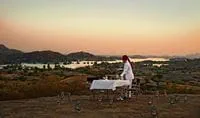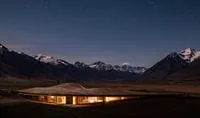Eco Hotels in Asia & Australasia
Home to a myriad of hotels that put the environment at the top of the agenda, Asia is a leading light when it comes to proving once and for all that sustainability and luxury are not mutually exclusive. We've chosen a handful of our favorite resorts across the continent, designed, built and run with nature in mind.

Destination Focus: Singapore
Singapore's iconic Gardens by the Bay are a nod to the forward thinking nature of a city state in hot pursuit of the moniker 'City in a Garden'. From eco friendly shopping and abundant green spaces to sustainable built skyscrapers, green mindedness has crept its way into every nook and cranny of the Singaporean way of life.

Built from local materials, including woods of teak and mara, and 'illuk' grass roofs, Gal Oya Lodge brings ecological luxury to Sri Lanka's little-visited Gal Oya National Park. With nine spacious bungalows, and a two-bedroom villa, this is the ideal accommodation option for guests looking to relax in a spectacular setting, while feeling secluded. Guests can also spend their time walking in the national park with a naturalist, going for picnics, or even meeting the Veddas, Sri Lanka's indegenous people.

Mahu Whenua Ridgeline Homestead & Eco Sanctuary is a heavenly property that sits across 500 square kilometers of outstanding natural beauty, all protected by the Queen Elizabeth II National Trust. Maori for 'healing the land', this is far more than your average eco-lodge, Mahu Whenua is one of the largest privately-owned conservation in New Zealand. Spend endless time exploring the different areas of this beautiful region, your concierge can advise you on how to make the most of your time.

A stunning architecturally designed lodge on the South Island, The Lindis blends seamlessly into the landscape. The lodge offers the ultimate mix of adventure, escape and privacy. The Lindis boasts one of the top fly-fishing locations in the world, with the Ahurir River running through the property. Just a short walk from the lodge enjoy scenic hikes, mountain biking or horse riding.

Phum Baitang, which means 'Green Village' in Khmer is one of Siem Reap's most luxurious and elegant hideaways, with just 45 spacious stilted villas that are wrapped in luminous greenery and finished with high-quality interiors.

Uncluttered, natural, and sympathetic to its tranquil surroundings, Six Senses Krabey Island is a wonderful retreat to help completely unwind after a touring itinerary through Southeast Asia. With only 40 pool villas peppered throughout its 30 acres of the island, the property feels intimate, private, and incredibly welcoming. The spacious villas boast a chic and airy living room with room for an extra bed. They have spoiling master bedrooms with light woods, soft linens, and dreamy bathrooms with large bathtubs.

Nature has inspired Bawah in both its design and ethos. Crafted in bamboo and taking on the shape and silhouette of the island on which it is built; Bawah is undeniably in touch with its natural surroundings. The vegetation surrounding the resort is lush because the resort was painstakingly built to ensure as little damage to the environment as possible, which consequently extended the build time considerably. Yet cutting corners is not in the psyche of the masterminds of Bawah, and thanks to its holistic approach, the resort is proudly self-sufficient.

The Coconut Lagoon has sustainability at its core. As part of the CGH Earth group, the resort is particularly conscious of the delicate eco-sphere that it calls home. At Coconut Lagoon, jumping at the chance to join naturalists at the resort to learn about the fascinating biodiversity of the Vembanad Lake, one of India’s largest lakes and home to many species of plant, bird and animal life, is bound to enrich your Keralan adventure.

Seemingly everything that Lizard Island does showcases an unwavering commitment to protecting, nurturing, maintaining the harmonious relationship between the resort and the diverse eco-system of Lizard Island and the surrounding reef. Lizard Island was Ecotourism Australia’s flagship program, introduced to ensure that best practice is adhered to when it comes to ecological sustainability, natural area management and the provision of eco-tourism experiences

Nihi Sumba is a luxury resort with an eco-conscience, giving guests the chance to get back to nature without scrimping on style. Modelled on a traditional Sumbanese house, Nihi Sumba is one of the few hotels in the world that runs entirely on bio fuel - a reminder of its fierce commitment to an eco-friendly stance. Serving produce from its organic garden, avoiding urban development and supporting a turtle hatchery, Nihi Sumba's green credentials speak for themselves.

Sal Salis is committed to protecting the pristine natural environment that surrounds it, the marine life of Ningaloo Reef and the diverse flora and fauna at home there. The hotel was built to ensure minimal impact on the environment, the color of the tents to blend in with its natural surroundings and almost 100% of the camp’s power is generated by sun. With composting, chemical free linen and water limited to only 20 litres a day (and strictly no internet), this is getting back to nature in style.

Six Senses Con Dao not only puts profits towards a mineral water supply for the children at a local primary school on the island but is also committed to reducing the carbon footprint of the resort and its world-renowned spa. Significantly, the resort aims to protect the sea grass beds surrounding the resort which are a natural habitat for rare dugongs. On top of this, Six Senses Con Dao offers swimming lessons to the inhabitants of neighboring Con Son Island; an initiative put in place to protect local children and educate about the dangers of the sea.

Sustainability sits high on the agenda at Six Senses Yao Noi as the hotel embraces the environmental commitment of the Six Senses family. Built on the site of a former rubber plantation, the resort has made a conscious effort to design and shape the landscape as it would have been if the area had been left untouched, regenerating tropical flora by planting fruit and indigenous plants to attract wildlife to the area. In front of the resort lies a unique mangrove forest, which the resort actively protects - while safeguarding the biospheres it hosts - and uses for educational purposes. In the resort itself, they are always looking for ways to reduce waste and black plastic is avoided as much as possible.

Across Soneva, the net impact of all of the resorts is positive. By moving towards renewable energy sources and banning the use of bottled water, the resorts have successfully offset the carbon footprint of guests arriving at each of their hotels. Food such as fish is locally sourced and at Kiri, they produce their own cheese and cultivate mushrooms on site. The construction of a water reservoir provides the resort with fresh drinking water. A coral restoration project at the resort in 2011 has been deemed successful after the discovery of 69 different species of fish.

At the heart of Song Saa is its eponymous foundation, which has a long-standing commitment to sustainable development and improving the livelihoods of communities of the Koh Rong archipelago. The resort has set the benchmark for sustainable tourism in the local area by avoiding the use of plastic, preserving the ocean habitats, protecting the mangrove forests and conserving the rainforest systems of the island. This is luxury that treads lightly to keep the island as pristine as possible.

After launching its Earth Lab initiative in 2017, Six Senses has gone one step further to showcase its sustainability efforts. Reducing plastic usage, producing locally, and supporting local communities and eco-systems are all concerns for the Earth Lab and the work underway at Six Senses Laamu is no exception. The idyllic resort constantly monitors its progress and performance in line with Green Globe Benchmarks and aims, wherever possible, to employ people from the Laamu atoll.

The forefathers of barefoot luxury, Soneva is pioneering the way for environmentally friendly resorts in the Maldives. Plastic bottles are not used at all at Soneva resorts, and with a glass recycling plant at Soneva Fushi, all glass is recycled -and then reused- on site. Valuing first and foremost its pristine environment and enjoyment of open spaces, founders Sonu and Eva go the extra mile to prioritize sustainability.
Call us on 858 345 1762 to start planning your vacation
Why Scott Dunn?
Unique to You

- We listen to your travel goals and craft unique trips that are personalized to you.
- We’re with you every step of your life’s travel journey, from honeymoons to family trips and beyond.
Seamless Service

- Global offices in the UK, US, and Singapore for 24/7 seamless service.
- We offer flexibility if your plans change so you can book with confidence and peace of mind.
Carefully Curated Collection

- We’ve curated an elevated collection of accommodation, experiences, and guides.
- Committed to fostering close global relationships to continue bringing you unique experiences.
Luxury in Every Sense

- We deliver a sense of luxury that matters most to you.
- Awarded Condé Nast Traveler’s Top Travel Specialists in the World 12 years in a row.



